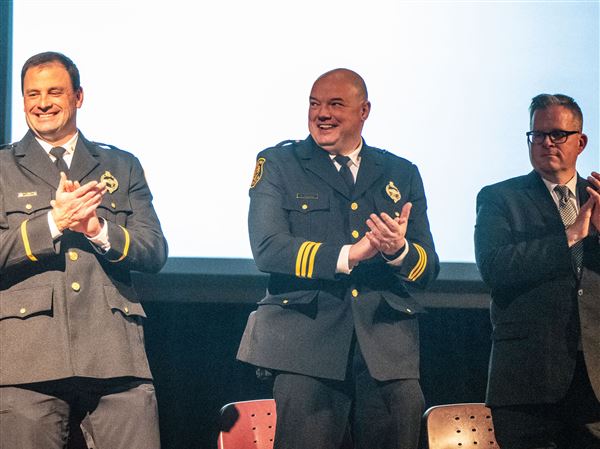Horror films are far from dead in the city of zombies, with funding secured for three new productions and, with them, a herd of Pittsburghers looking to participate in the local creative economy.
In May, the Richard King Mellon Foundation awarded $3 million to nonprofit Partner4Work and production company Pittsburgh Pictures to produce three independent horror films in southwestern Pennsylvania over the next three years. Through the new program, called the Filmmakers Industry Partnership, Partner4Work hopes to foster a new generation of creative workforce professionals in the region.
The partnership adds to a growing list of programs that support the local creative economy by providing jobs and training, and also host film production in Pittsburgh. For Partner4Work, an employment development organization, it represents the first program geared specifically toward the creative workforce.
The three horror films are in the script development phase this summer, as Pittsburgh Pictures scouts filming locations across the region, said Robert Cherry, CEO of Partner4Work. While little is yet known about the film’s plots, the first of the trio is slated to start production in 2025.
The films will be small, independent projects, produced by Pittsburgh Pictures, a new, independent production company run by Jimmy Miller and Eric Gold, both Hollywood producers with Pittsburgh roots. While Miller and Gold will provide some Hollywood pizzazz, the films are “geared toward lifting up local talent and new talent,” Cherry said. “I don't think that big actors are coming into town for these films.”
Partner4Work will be the Filmmakers Industry Partnership’s fiscal agent and help employ up to 210 Pittsburghers and 30 interns to work on the productions, according to Cherry.
Film sets create significant employment opportunities: They require actors with speaking parts and background actors but, behind the scenes, they also require lighting technicians, makeup artists, wardrobe designers and other roles. They also employ workers in construction, catering, transportation, accounting, and production assistance, Cherry explained.
For the average Pittsburgher, construction or transportation might not scream “film set,” which is exactly why Partner4Work wants to connect people to jobs in creative fields and publicize those opportunities to people working in other industries.
“Partner4Work will further define and build out career pathways into the creative economy, making sure that people understand the tracks, because these are really good jobs,” Cherry said.
The nonprofit hopes to make those pathways to creative careers transparent, he explained, by “career mapping” opportunities in the local creative industry. Partner4Work first plans to identify six in-demand, entry-level opportunities in local creative fields. Then, they plan to collaborate with education partners to effectively communicate with creative hopefuls about the important credentials for working in creative fields.
In Cherry’s estimation, the Filmmakers Industry Partnership will have a positive impact on the local creative economy by bringing a greater volume of productions to the region that will then employ locals.
According to Dawn Keezer, executive director of the Pittsburgh Film Office, the partnership will act as “a feeder” to other local programs building interest in the local creative industry. Keezer hopes that the partnership brings new people into Create PA, a workforce training program run by the Pittsburgh Film Office and the Pittsburgh Public Theater.
Productions want to work in southwestern Pennsylvania because of talented crews available, diversity of locations and relatively low cost of doing business compared to other major filming areas, Keezer said. Pittsburgh, one of two production centers in the state, can look like major cities on camera, like New York, without producers needing to spend the money to film in those cities.
Pittsburgh is also home to 2,400 creative professionals, according to a 2023 RAND report on the Pittsburgh film industry. Keezer estimated that number to be more than double, closer to “5,000 people in southwestern Pa. [who] rely on the film industry for all or some of their employment and bottom lines for their businesses,” she said in an email.
Many of those local creative professionals, like Oy Adebajo, 22, of Edgewood want to continue utilizing programs like the Filmmakers Industry Partnership to further their careers in Pittsburgh. Adebajo graduated this year with a bachelor’s degree in theater from Muhlenberg College and, over the summer, is interning with the Pittsburgh Public Theater through the city’s Learn and Earn Summer Youth Employment program.
Adebajo’s passion for screenwriting saw her write her first screenplay at 17 and later take a role as an extra on the set of “The Deliverance,” coming to Netflix in late August.
Adebajo attested to the vibrant film and art scene in the region, pointing out that while many big-name productions come to Pittsburgh to film, the local art scene also remains strong.
“The film scene in Pennsylvania has always fascinated me,” she said.
“I've always found it so interesting and so diverse. I could definitely see myself staying here for say, maybe a decade, and really having a solid career.”
Elena Eisenstadt: eeisenstadt@post-gazette.com.
First Published: August 2, 2024, 1:13 p.m.
Updated: August 3, 2024, 1:34 a.m.




















